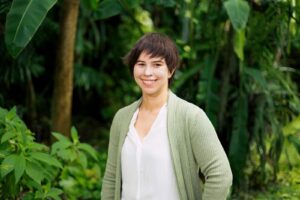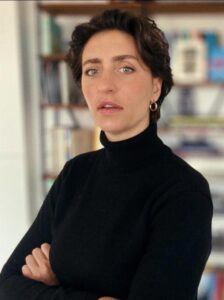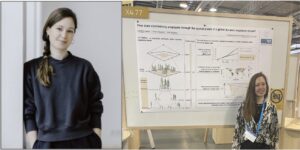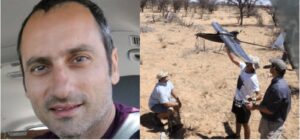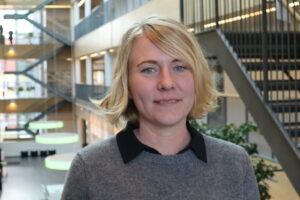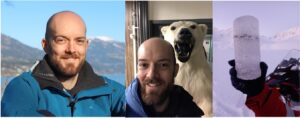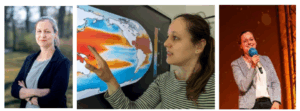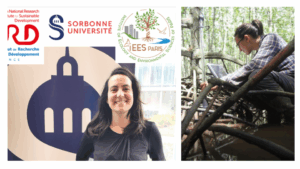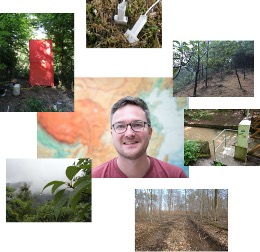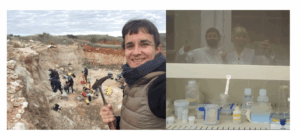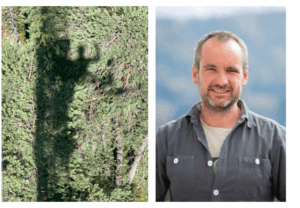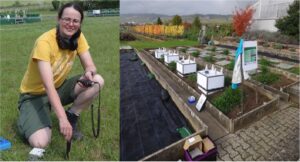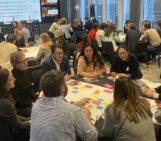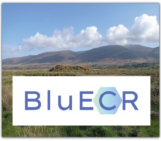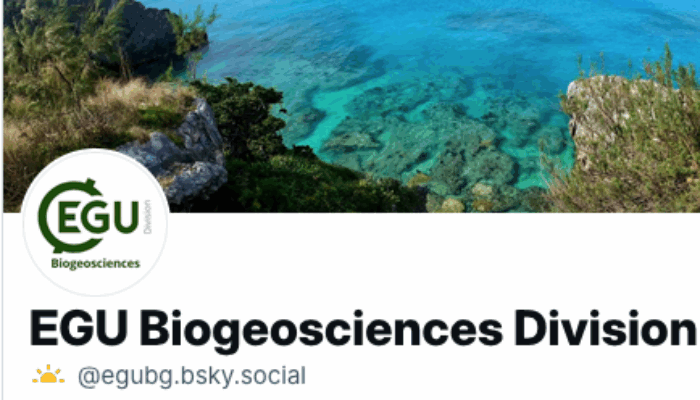
The Biogeoscience division team has changed over the last year, and in this blog post, we are delighted to introduce our new team of representatives and describe their roles and research interests so that you can get to know them better. Our division is led by a President and Deputy President, supported by two Early Career Scientist Representatives and several sub-division officers who cover various aspects of biogeosciences. We are also excited to introduce our new Policy Officer and the OSPP coordinators.
President: Ana Bastos
Ana Bastos obtained her PhD in Geophysical and Geoinformation Science from the University of Lisbon in 2015 and is since 2024 a Professor for land-atmosphere interactions at Leipzig University. In her career, she has conducted research and teaching in Portugal, the USA (Fulbright fellowship), France (LSCE), and Germany (LMU, MPI-BGC). Since 2019 she has been co-leading the RECCAP2 activity of the Global Carbon Project. In 2022, she received the Early Career Scientist Award by the Biogeosciences Division of the European Geosciences Union and was granted an ERC Starting Grant to advance understanding about forest vulnerability to compound extremes under climate change. In 2024, she was elected president of the Biogeosciences Division of the European Geosciences Union. Beyond Earth System Science research and teaching, Prof. Bastos is engaged in promoting diversity and inclusion and supporting work/private life balance and mental health in academia. She also loves swimming and cats!
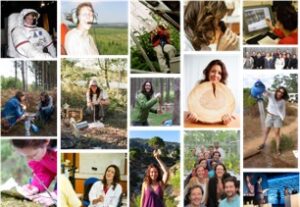
Deputy President: Lisa Wingate
Lisa (she/her) has been the president of the BG division from 2020 to 2025 and is now the Deputy president. She works as a researcher for INRAE in Bordeaux, France. She has a passion for the natural world and has conducted research on how plants and soil microbes influence atmospheric chemistry. Additionally, she investigates how feedbacks between atmospheric chemistry and climate will impact biosphere functions using a range of tools and at different scales. Lisa is also an active member of the EGU Equality, Diversity & Inclusivity Committee. You can follow her on Bluesky: @lisawingate.bsky.social.
ECS Reps: Elsa Abs and Sílvia Poblador
Elsa (they/them) is a CNRS researcher at the Laboratory for Sciences of Climate and Environment (LSCE) near Paris. Their work explores the intersection of Darwinian evolution and climate science, focusing on how soil microbes adapt to climate change and how this evolution, in turn, influences the global carbon cycle. Elsa is also the founder of the “Early-Careers Engaged for Climate” group at the Institut Pierre-Simon Laplace (IPSL). You can follow them on BlueSky: @elsa-abs.bsky.social.
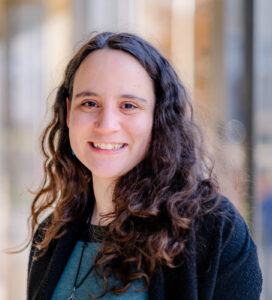
Sílvia Poblador (she/her) is a Postdoctoral Marie Skłodowska-Curie Fellow at CREAF (Center for Ecological Research and Applications), near Barcelona. She is a soil biogeochemist that investigates enhanced weathering processes to increase soil carbon sequestration and reduce N2O emissions from agricultural soils. Sílvia is an advocate for Women in Science and is part of the Gender&Science AIL Group and the Diversity and Inclusion in the Scientific Community (SIBECOL).
Read more about our ECS reps here!
Blog Chief Editor: Lucia S. Layritz
Lucia (she/her) is a Postdoctoral researcher at the Schmidt Center for Data Science & Environment at the University of California, Berkeley, USA. where she supports the National Park Service in their fire management decision making. More broadly, she researches ecosystem recovery processes from natural and human disturbances in boreal, Mediterranean and desert ecosystems, both with stochastic vegetation models and remote sensing. Lucia is the Editor-in-Chief of the Biogeosciences blog. She is passionate about data visualization and scientific illustrations and you can find her and her work around the internet under @lucialayr.
Sub-division officers: Our sub-division officers represent the various themes within the BG division. You can contact them about blog posts or campfire events related to their topics or for new General Assembly session proposals within their themes.
Biogeosciences Policy & Society: Elias Symeonakis and Magdalena Bieroza
Elias (he/him) is an Associate Professor in Earth Observation and GIS at Manchester Metropolitan University, UK, where he leads the Remote Sensing Group. Elias participated in the EGU/European Parliament Science-Policy Pairing Scheme in 2022 and is the lead author of UNEP’s ongoing 7th Global Environment Outlook report. His research interests focus on using satellites and drones for vegetation monitoring in drylands and savannah environments, with a particular emphasis on land degradation. He is the BG division’s point of contact for policy.
Dr. Magdalena Bieroza (she/her) is a Senior Lecturer at the Swedish University of Agricultural Sciences. She is a hydrologist, biogeochemist, and computer scientist focusing on understanding nitrogen, phosphorus, suspended sediments, and organic matter dynamics in headwater streams subjected to human disturbances and remediation. Her work involves in situ measurements of dominant processes with the state-of-the-art techniques such as high-frequency water quality monitoring and advanced numerical analysis to detect established and emerging patterns in hydrochemical data such as concentration-discharge relationships and process-based models to establish the relative importance of hydrological, biogeochemical, and management drivers on streamwater quality signals.
Geomicrobiomes & Function: Christoph Keuschnig
Christoph (he/him) is a Postdoctoral Fellow in the Interface Geochemistry Section of the German Research Centre for Geosciences (GFZ) in Potsdam, specializing in environmental metagenomics. His research interests include microbiome function in Arctic ecosystems and the impact of fungal-bacterial interactions on biogeochemical processes in soil, utilizing next-generation sequencing techniques and bioinformatics.
Marine Biogeosciences: Sinikka Lennartz and Marie Arnaud
Sinikka Lennartz (she/her) is a Junior Professor at the Institute for Chemistry and Biology of the Marine Environment at the University of Oldenburg in Germany. She leads the Biogeochemical Ocean Modelling group, focusing on understanding the ocean’s global biogeochemical cycles and their role in our planet’s climate system. In particular, her group explores how microbial interactions influence the marine carbon cycle, by storing carbon in the ocean, and how climate relevant trace gases (carbonyl sulfide, carbon disulfide) from the ocean are exchanged with the atmosphere. The toolkit mainly includes numerical models, ranging from simple conceptual box models to complex global earth system models. She aims to bridge empirical observations with modeling efforts, to gain a comprehensive understanding of how our oceans interact with the climate.
Marie (she/her) is a Researcher at the Institue for sustainable development based at IEES, Sorbonne University (Paris). She is also an associate researcher at the University of Birmingham, UK. Her research interests include Blue Carbon ecosystems (mangroves and saltmarshes), organic matter, particularly in the context of global changes, and root-soil interactions across ecosystems. Marie is an advocate for women in science and anti-colonial science. You can follow her on Linkedin: https://www.linkedin.com/in/marie-arnaud-ph-d-36152a12/
Terrestrial Biogeosciences: Steffen Seitz and Bikem Ekberzade
Steffen (he/him) is a Senior Scientist in soil science and geomorphology at the University of Tübingen, Germany, where he leads the Vegetation and Erosion group. He leads studies in various forest ecosystems from humid to semi-arid. His research interests span vegetation and soil erosion, with a focus on biological soil crusts, ecohydrology, ecosystem functioning, and methodology in erosion research.
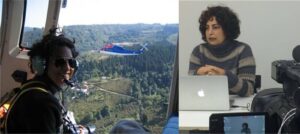 Bikem (she/her) is a Postdoctoral Researcher in the Eurasia Institute of Earth Sciences, Geohazards at Istanbul Technical University, Turkey, since April. Bikem’s research interests include climate change impacts on biodiversity and terrestrial ecosystems, particularly forest monitoring, modeling, geohazards, disturbance ecology, remote sensing, and land use. She is also a radio producer with a previous career in photojournalism and conflict reporting, and runs a podcast series for the Biogeoscience division.
Bikem (she/her) is a Postdoctoral Researcher in the Eurasia Institute of Earth Sciences, Geohazards at Istanbul Technical University, Turkey, since April. Bikem’s research interests include climate change impacts on biodiversity and terrestrial ecosystems, particularly forest monitoring, modeling, geohazards, disturbance ecology, remote sensing, and land use. She is also a radio producer with a previous career in photojournalism and conflict reporting, and runs a podcast series for the Biogeoscience division.
Paleogeosciences: Robyn Pickering
Robyn (she/her) is an Associate Professor in the Department of Geological Sciences at the University of Cape Town, South Africa, where she leads the Quaternary Terrestrial Ecosystems group and co-directs the Human Evolution Research Institute. Her research focuses on terrestrial carbonates associated with early human occupation sites in southern Africa. She also incorporates uranium series chronology, trace element geochemistry, speleothem petrology and diagenesis, palaeolimnology, southern hemisphere palaeoclimates, and landscape evolution in her work. Additionally, Robyn is dedicated to decolonizing geosciences, actively redressing issues for African scholars, and raising awareness about neo-colonialism in research practices. You can follow her on Bluesky: @pickeringrobyn.
BG OSPP co-ordinators: Albin Hammerle and Carolyn-Monika Görres
Albin Hammerle, is a Senior Scientist at the Institute of Ecology at the University of Innsbruck. As an ecologist, his research focuses on understanding the complex interactions between terrestrial ecosystems and the atmosphere. His main interests include trace gas exchange, carbon cycling, and ecosystem modelling and proximal sensing techniques. He is also deeply engaged in studying plant ecophysiology to improve our understanding of ecosystem responses to environmental change. For many years, his work was centered on managed alpine grassland ecosystems, where he investigated their role in carbon and energy fluxes and their sensitivity to land-use and climate change. More recently, he have shifted my research focus toward forest ecosystems, aiming to apply and expand his expertise to better understand forest dynamics, biogeochemical processes, and their role in the global carbon cycle under changing environmental conditions.</
Carolyn-Monika (she/her) is a Scientist at the Institute of Applied Ecology at Geisenheim University, Germany. Her research interests include greenhouse gas fluxes in terrestrial ecosystems, acoustic monitoring of soil biodiversity, stable carbon isotopes in GHG flux research, and the role of soil fauna in soil GHG fluxes. You can follow her on X: @CarolynGorres.

